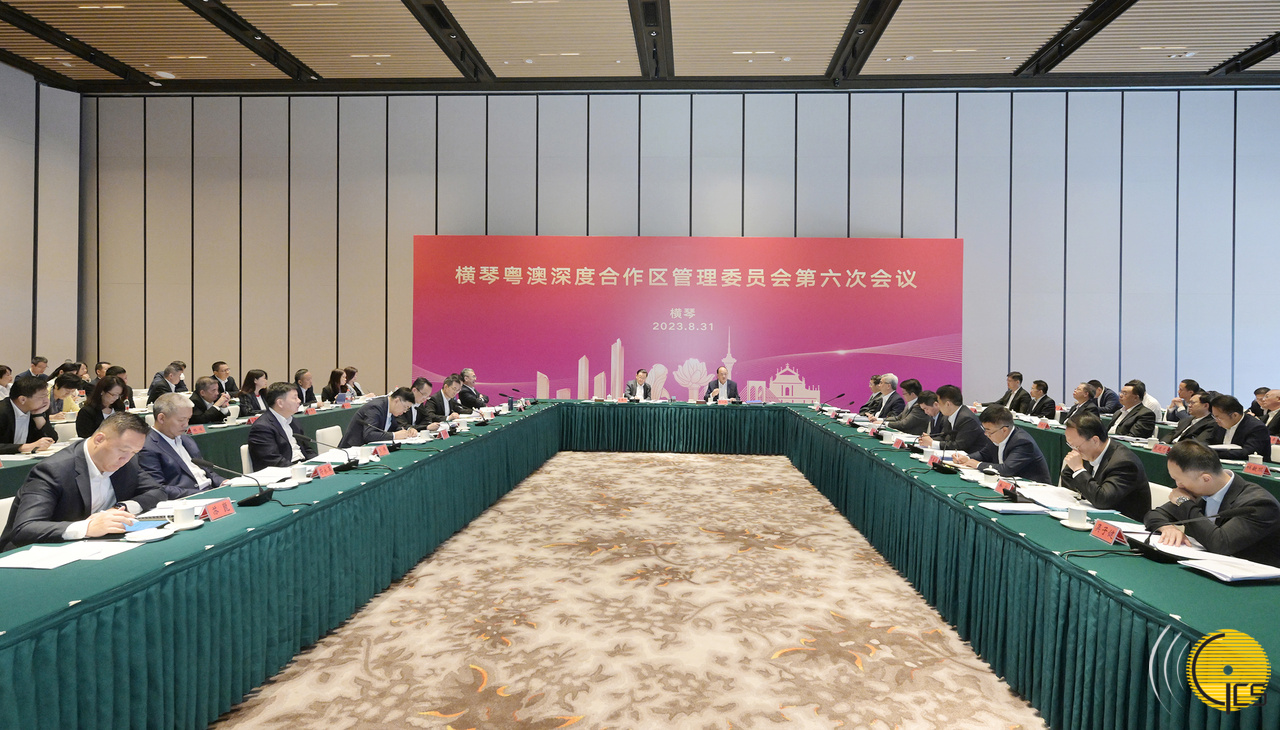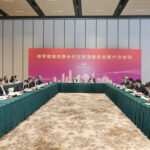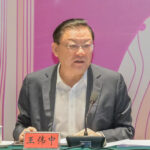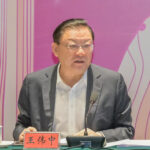 The Administrative Committee of the Guangdong-Macao Intensive Cooperation Zone in Hengqin holds its 6th meeting in Hengqin.
The Administrative Committee of the Guangdong-Macao Intensive Cooperation Zone in Hengqin holds its 6th meeting in Hengqin.
The Chief Executive, Mr Ho Iat Seng, said the Macao Special Administrative Region (MSAR) Government would step up the study of further measures to support the development of the Guangdong-Macao Intensive Cooperation Zone in Hengqin, namely in order to improve the promotion of joint investment attraction, and advance related cross-boundary infrastructure.
The Administrative Committee of the Guangdong-Macao Intensive Cooperation Zone in Hengqin held on Thursday (31 August) its sixth meeting, in Hengqin. The meeting was co-hosted by the two Directors of the Administrative Committee, Mr Ho, and the Governor of Guangdong Province, Mr Wang Weizhong.
At the meeting, members of the Administrative Committee reviewed the first half 2023 work report of the Cooperation Zone’s Executive Committee. They also discussed arrangements related to accomplishing the goals set for the first phase of development of the Cooperation Zone.
In his speech, Mr Ho said Macao and Guangdong were working to meet the goals planned for the first phase of development of the Cooperation Zone, including addressing existing obstacles.
The Cooperation Zone authorities had formulated an action plan addressing difficult tasks at a first phase, and both sides had jointly reviewed the relevant detailed and extensive task list, which fully reflected the strong support of Guangdong Province to the initiative, said Mr Ho.
At present, Macao’s economic recovery was enjoying good momentum, benefitting all sectors. Macao was pressing ahead with its “1+4” economic diversification strategy, and there were plans to align the city’s development with that of the Cooperation Zone. By taking advantage of all available favourable factors, the Cooperation Zone would be able to achieve a bright future, said the Chief Executive.
Governor Wang said Guangdong and Macao had already earnestly implemented a number of goals outlined in the Master Plan of the Development of the Guangdong-Macao Intensive Cooperation Zone in Hengqin, making every effort to advance critical actions mentioned in it, in order to promote the development of the Cooperation Zone.
Next year would mark the 25th anniversary of the establishment of the MSAR, and was the target year for completion of the goals set for the first stage of development of the Cooperation Zone, noted Mr Wang.
Governor Wang called for further effort to realise goals outlined in the Master Plan. The two sides should make every effort to promote the implementation of the “tier-specific” regulatory system envisioned by the Master Plan, ensuring operational conditions for its implementation were in place by the end of this year. Further effort should be made to focus on Macao’s four major industries; accelerate the introduction of industrial project resources to the Cooperation Zone; connect the Cooperation Zone with Macao capital and Macao enterprises; promote more prosperous projects with Macao elements in the Cooperation Zone; optimise relevant systems and mechanisms; delegate a number of provincial administrative powers to the Cooperation Zone whenever suitable; and attract a greater number of talented professionals to work or start a business in the Cooperation Zone.
It was necessary to strengthen publicity and promotion around the second anniversary of the establishment of the Cooperation Zone, fully demonstrating the successful practice and bright prospects of the Cooperation Zone model, added Mr Wang.
Officials attending Thursday’s meeting included the Administrative Committee’s Executive Deputy Director, Mr Cheong Weng Chon; the Administrative Committee’s Deputy Directors Mr Zhang Hu, Mr Zhang Xin, and Mr Wong Sio Chak; and Secretaries-General Mr Nie Xinping and Mr Lei Wai Nong.





